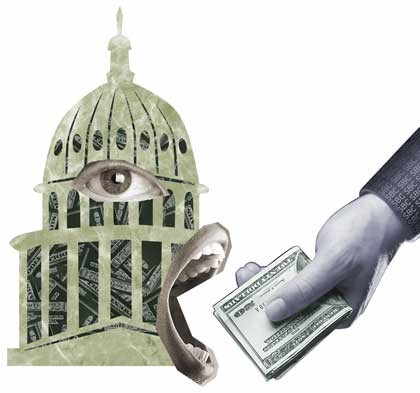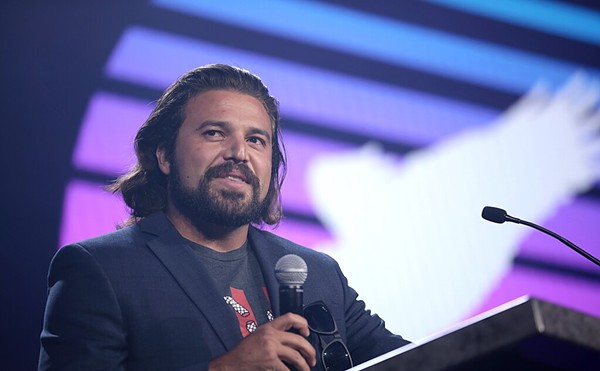The telephone industry poured as much as $12 million into lobbyists and political action committees, and in return they got SB 5
In July, at the outset of the 79th Legislature's special sessions, Governor Rick Perry swore to Texans that lawmakers' priority would be education and property tax reform, and that not one bill would make it out of the Capitol ahead of those measures. Yet, a month later, as education reform withered, the legislature passed three other bills, including the much-debated Senate Bill 5, which deregulates basic telephone rates and allows statewide cable franchises.
The fact that the telecom bill leap-frogged over education reform seems a monstrous feat: Like Frankenstein, the bill died several deaths on the Senate and House floors in the regular session, only to be reborn and undergo numerous complex amendments during the special session. Yet, considering the number of lobbyists and amount of money funneled into the bill, it's not surprising. A recent Texans for Public Justice report shows that telephone interests doled out up to $12 million to lobbyists and political action committees to get the bill passed into law, six times more than the cable industry's $2 million. Not to mention that the telephone industry's lobbyists had legislators outnumbered 209 to 180.
If that seems like a lot of money, remember the bill's stakes were high: Industry analysts say the Texas cable market is worth between $2.5 and $3.3 billion a year.
According to the Texas Ethics Commission, SBC lead the pack on lobby spending, paying 123 lobbyists up to $6.7 million. SBC spokesman Gene Acuna says those numbers may be misleading. "A number of those `lobbyists` are regular employees, such as lawyers, executives, external-affairs managers. Anyone that may have contact with a legislator, we register them."
Acuna says the TPJ report was unfair because it didn't account for the cable industry's advertising spending during the special session. "Keep in mind, if Comcast spent $8 million on advertising, which they did, then we were drawn into a media battle and had to respond," he says. "The cable companies refused to sell us ad time, so SBC was forced to go to broadcast media, and this was during sweep times. And that certainly adds up." How much? He says he doesn't know; SBC hasn't yet filed its advertising spending report with the Texas Ethics Commission.
Kathy Grant, a Texas Cable and Telecommunications Association lobbyist, points out that broadcast advertising isn't an apt comparison, because cable companies aired advertisements on their own networks, so while the reporting process requires them to state the retail value of air time, those numbers don't accurately represent expenditures.
The Texas Cable and Telecommunications Association, the cable industry's biggest spender, paid 11 lobbyists up to $685,000. "A lot of people will argue `123 lobbyists` is excessive, you know, My, what a powerful lobbying force," Grant says. "SBC has only marginally fewer lobbyists in Texas than they do in D.C. I don't know if that's what it takes. I certainly will say that the difficulty we had shows what it is to be up against that."
The telephone industry also outspent the cable industry in PAC donations; according to TPJ, telephone interests spent $1.5 million where cable spent only $359,000, and telephone interests gave Governor Rick Perry $176,000, while cable gave him $25,000. TCTA made zero donations to the governor's campaign or interest groups.
Grant says the TCTA was approached for a donation by Texas One, a marketing program within the Governor's Texas Economic Development Corporation, but that SBC had already pledged at the highest level, $50,000. "Why would we bother?" she says. "After SBC had given so much, what we could give would be a grain of sand."
"It's pretty rough having to compete with some of the large corporate lobbying firms," adds Dally Willis, a lobbyist for the Communication Workers of America, which has been credited with drumming up legislative support for SB 5, particularly among pro-union Democrats. "When there's only two of you and you have to see 180 people, and sometimes they're tied up half the day in hearings, it makes it intense."
Willis, a member of CWA since 1946 and a lobbyist since 1961, says the union doesn't have a lobbying budget, but it doesn't necessarily take money to influence policy. CWA's 30,000 Texas members use community activism to get their way in the legislature. "It's grassroots; we ask our people to stay in constant contact with their senators and representatives, to work on their campaigns and call and write them about their issues."
Luke Metzger, a lobbyist at TexPirg, which opposed SB 5, agrees. "We have been able to pass some good consumer protection," even when outnumbered and outspent. He says it was hard to find telecom lobbyists to hire. "AARP was looking for one; they finally hired someone and a week later he called and said he'd been put on the payroll for SBC. The rest of us were shut out of the game," he says.
Metzger and Grant say that educating the public on SB 5 was a challenge because telecom policy is obscure; it tends to hide on the back page, while school reform makes the headlines, and consumers and legislators don't fully understand it. "People in the legislature are not `telecom` experts," says Grant. "So the chairs of the committees become very strong, and there is not really anyone in a position to argue. We call them 'follow the leader' bills."
SB 5 and its companion bill, HB 13, were authored, respectively, by Senator Troy Fraser (R-Horse Shoe Bay), chairman of the Business and Commerce committee, and Representative Phil King (R-Weatherford), chairman of the Regulated Industries committee. Fraser received $14,400 in campaign contributions from telephone interests, $6,000 from cable; telephone interests fattened King's coffers by $32,350, cable $7,000.
"It makes it difficult to make our case. A huge lobby effort, a complicated bill, and SBC giving campaign contributions to everyone and their mother ... all of these were a factor," adds Metzger.
Acuna says SBC hasn't exercised undue influence, and that the bill passed because of "overwhelming support on the House and Senate floor," rather than lobby and PAC pressure. Yet, it didn't pass in the regular session. "There were a lot of negotiations and time simply ran out on the bill," explains Acuna.
Ironically, that's what happened to Governor Perry's education reform in the special sessions convened to address it. "During a telecom vote, the House gallery would be jam packed," says Metzger. "Afterwards, the entire gallery would empty out. All the lobbyists would leave; their priority was done for the day." •
By Susan Pagani


















